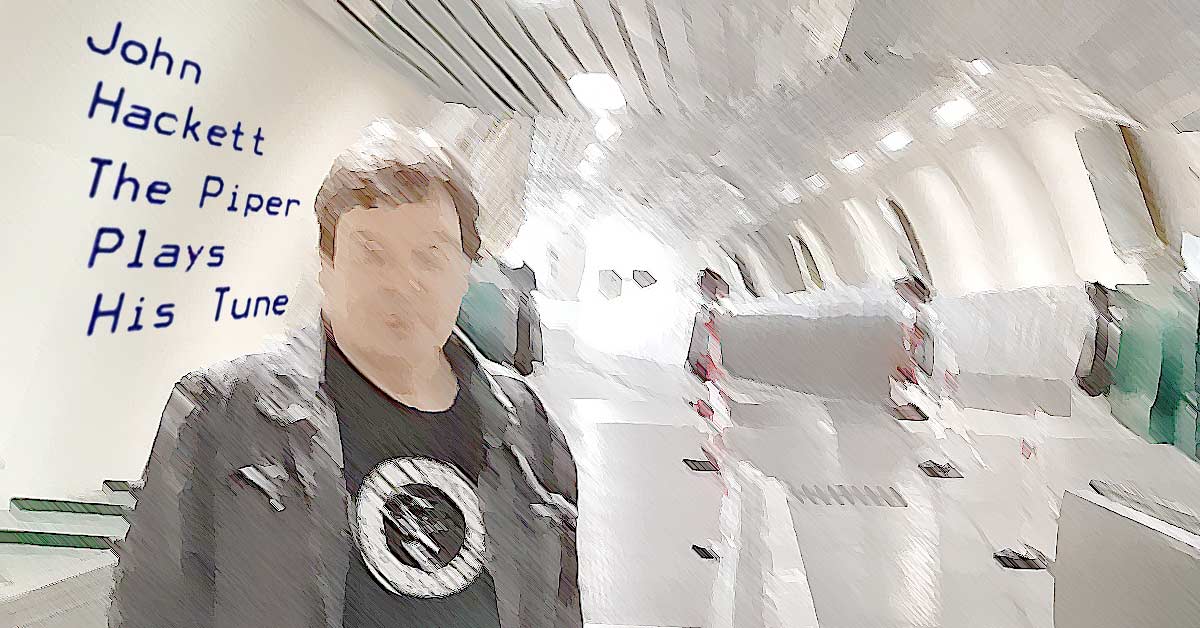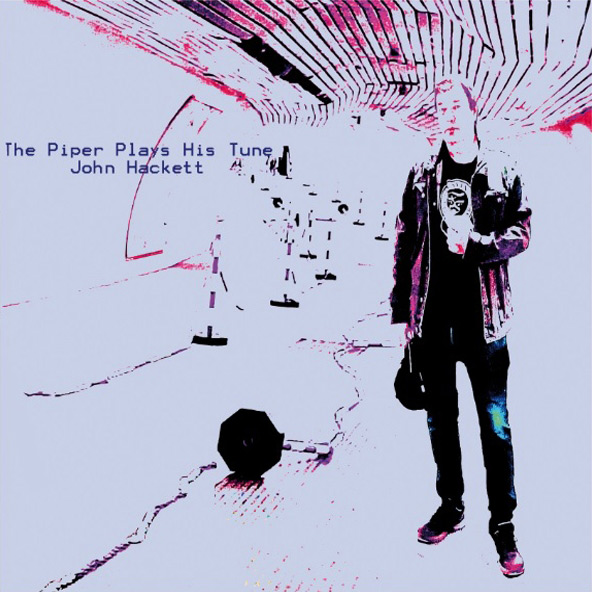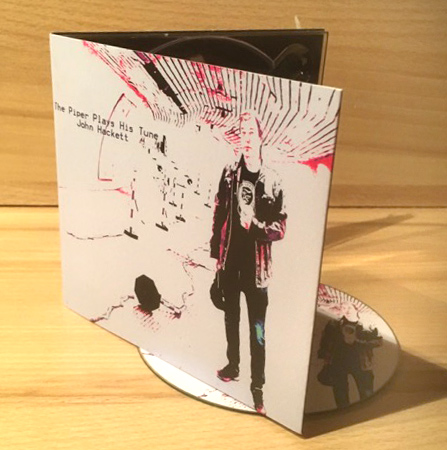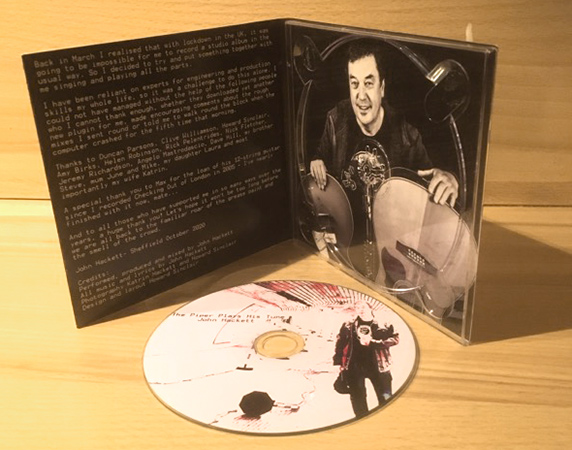- Article
- Read in 6 minutes
John Hackett – The Piper Plays His Tune – review
During the COVID lockdown, John Hackett has written and recorded another solo album (a rock album actually). Thoms Jesse took a closer look.

Prologue:
Steve Hackett’s “little” brother John is not someone Genesis fans are unfamiliar with. After all, he was involved obliquely in Steve’s joining Genesis (*1), played the flute on many of his brother’s solo albums and has created a large artistic oeuvre in his own right.
As far as I am concerned, he stepped out of his brother’s shadow on their joint album Sketches Of Satie. His flute playing and his arrangements there are breathtaking.
 His range extends well beyond that. With his band Symbiosis, he has made himself at home in New Age, he plays classical and acoustic music, has his own rock band and is open for influences from prog, jazz, or folk.
His range extends well beyond that. With his band Symbiosis, he has made himself at home in New Age, he plays classical and acoustic music, has his own rock band and is open for influences from prog, jazz, or folk.
Before the pandemic hit he would frequently play live in England. Not only did the lockdown interrupt those activities but it also put a stop to the recording of a band album..
John Hackett made the best of it: “So I decided to try and put something together with me singing and playing all the parts” (*2). He also took care of the mix and the production.
Title and layout:
The digipak was designed by Howard Sinclair, with John’s wife Katrin providing photos. The cover shows John Hackett with a cap and a mask in his hands near a moving walkway in Italy in an underpass from the coach station to the center. The photo has been treated in an artistic way. Only the outlines of the things in the background can be seen; bits of violet colour accentuate the background and John himself. The overall effect is, perhaps, that of a faded photograph or a slide. The world dissolving due to the corona virus? Symbolized by the image of a lonely man lost in mass transportation? Is the mobility we were accustomed to fading away?
The black-and-white interior comes with liner notes and shows John with guitars and a flute. You can download the lyrics from John’s website, Hacktrax (*3).
The songs:
Masters Of My Past (4:40)
 The album begins with an organ part. Warm vocals, bass and drums join in. We hear memories of dusty books, chalk dust and secret looks. The first line of the chorus tells us about Victoria in the rain (*4), and, actually, the chorus is very catchy. After one and a half minutes an unspectacular guitar solo comes in that proceeds to accompany melody and vocals.
The album begins with an organ part. Warm vocals, bass and drums join in. We hear memories of dusty books, chalk dust and secret looks. The first line of the chorus tells us about Victoria in the rain (*4), and, actually, the chorus is very catchy. After one and a half minutes an unspectacular guitar solo comes in that proceeds to accompany melody and vocals.
When the chorus reoccurs we feel caught up in Victoria in the rain, thinking with nostalgia of the past that was replaced by the hectic modern world. A melancholic piece of music that develops some progressive elements with changes in time signatures. Bass and drums gently nudge the song into a soft fadeout after four minutes.
Broken (4:34)
Piano and calm, wistful vocals begin with the chorus. It sounds like a more recent piece by brother Steve. Synth strings accompany the bass and the piano until a tinkling guitar comes in at 1:44. The mourning for a lost love finally dissolves at 2:20 in a beautiful brief flute solo. The chorus returns half a minute later to evolve into a guitar solo. Piano and flute join in and let the melody of a broken love fade away. John sings beautifully, and he really conveys the sorrow. In this song he is very close to Steve’s material.
In Love (4:45)
The music turns happy, the lover finally find each other. The musicians play up as in Steve Hackett’s Defector times. It’s hard to believe that John plays all the instruments himself! An organ part may remind you of Genesis around the time of Foxtrot. Breaks played on a wavy flute, guitar and bass show John’s affinity for progressive rock..
Crying Shame (5:14)
What a beautiful flute solo to introduce one of the key tracks on the album! This song is about the disgraceful things mankind does on and to this planet. Does the flautist introduce the end of mankind? Does he exhort us not to continue like this? Wonderful flute parts that remind us of King Crimson’s first album, fine guitar solos, great bass, vocals and a relaxed drum sound from the computer crown the piece that, incidentally, contains the line that became the album title. John proves that he is very good at playing the guitar, too.
Broken Glass (4:53)
Dark piano sound start off a calm song with occasional outbursts by the vocals. The singer walks through streets, past people who hurry around thinking of themselves only, and would like to shake them awake so that they think about what’s important in life. Minutes later the situation has changed: The singer walks through the empty streets during lockdown and misses all the people who are so busy that the forget everything around them. He has to force himself to consider the beautiful things in his life, and it feels like walking barefoot across broken glass. Whose fault is it? The break (two minutes into the song) is so sad that it moved me to tears. A solo guitar brings the song to its end.
Julia (3:28)
 A gentle pop/rock song that may remind you of the late 70’s Strawbs, Al Stewart, or The Beatles. A fine rhythm change in the last third of the song stands out. The song is about a highschool quite who is worshipped by all the boys, parties hard, remains unreachable for the singer, becomes alcoholic and leads just an “everyday relationship” in the end. If only she’d listened to the singer back then. Keyboard flourishes introduce the end.
A gentle pop/rock song that may remind you of the late 70’s Strawbs, Al Stewart, or The Beatles. A fine rhythm change in the last third of the song stands out. The song is about a highschool quite who is worshipped by all the boys, parties hard, remains unreachable for the singer, becomes alcoholic and leads just an “everyday relationship” in the end. If only she’d listened to the singer back then. Keyboard flourishes introduce the end.
To Late For Dreamers (4:06)
A sentimental little song about the carefree youth in 1963. Tinkling guitar, piano, acoustic guitar and a marvellous flute solo take part in a song with a wink. This is really good fun, particularly the whistling with which it ends.
Clown (2:50)
The shortest song kicks of the final trio of songs on the album that deal with the ups and downs of love in a merrier musical fashion.
A fun rock’n’roll with nice vocals, a brief guitar solo and a fine melody.
Loved You(4:35)
Now this sounds like Alan Parsons Project gone Mike & The Mechanics. A love song in which the one who was dumped wonders why the relationship broke up. This easy pop song ends with a guitar solo that is far too short.
There You Go Again(4:54)
Acappella vocals are fast accompanied by a piano before the other instruments join in. A smirking melancholy develops and is interrupted by an excursion into baroque chamber music at 2:40. J.S. Bach is the godfather of that bit. An up and down of melodies and speed remind me of a milder Gentle Giant. Some fine acoustic guitar work (too short!) bring the song and the album to an end.
All in all:
John Hackett has written an unobtrusive album marked by a calm atmosphere that oscillates between melancholy and sentimentality. You can relax and listen. There are surprisingly few, but really marvellous flute solos as accents. John’s virtuoso guitar, his lovely vocals and his ability to play a number of instruments are good for surprises here. The album does not have the long solos and overflowing compositions of his brother’s. The songs appear organic, not looking for effects, and not glued together from various bit. The lyrics are about love, memories from youth, and the effects of what mankind does to earth (the result of which is, amongst other things, the Corona pandemic). The shape and structures of the songs are frequently similar. Apart from that, the only things we might criticize ever so gently are the synthetic drums and an occasional lack of expression in the vocals.
This is nevertheless a recommended album between pop and rock, prog and classic, folk and songwriting. If you enjoy the melodious, song-oriented side of Steve Hackett’s output and don’t expect ambitious prog or straight rock, then this flutist will often play you his beautiful tunes.
It is an album you can play in the background, and yet it also rewards careful listening.
Notes:(*1) cf. Steve Hackett, A Genesis In My Bed, p.58: Steve and John played some songs to Tony and Peter.
(*2) from the liner notes to the album
(*3) https://hacktrax.co.uk
(*4) Which Victoria is this? The Hackett family lived in Pimlico, London. Victoria, named after the train station, borders on Pimlico, and both belong to the City Of Westminster, the core of London.
